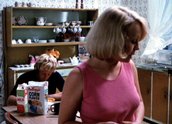


Petersen (1974)
Synopsis
Retired Australian Rules football star Tony Petersen (Jack Thompson) quits his job as an electrician and enrols at university to study for an arts degree. Married to Susie (Jackie Weaver) and the father of two young children, Petersen is having an affair with tutor Patricia 'Trish’ Kent (Wendy Hughes), the wife of Charles (Arthur Dignam), Petersen’s supercilious professor. On a dare from a feminist action group, Petersen performs a sex act on the campus lawn with Moira (Belinda Giblin), the daughter of a high ranking judge. Petersen and Susie spend a weekend with best mate Pete (John Ewart) and his wife Marg (Sandy McGregor). After too many drinks, Petersen and Marg decide to make love and are caught by Pete. Trish takes Petersen away to her beach house, only to find Charles there with Jane (Helen Morse), his student lover. Trish asks Petersen to father her child. After talking things over with his father (Charles Tingwell), a clergyman who has lost his faith, Petersen decides to leave Susie and accept Trish’s offer. Before he can tell her, Trish reveals she has accepted a job at Oxford. Enraged, Petersen rapes her and goes on a drunken binge. Severely beaten by two police officers, Petersen returns to Susie and drops out of university.
Curator’s notes
Both praised and dismissed when it was released, Petersen was a box-office success and received wide distribution in the UK and US under the title Jock Petersen. It marked the second collaboration of director Tim Burstall and writer David Williamson, who’d scored a hit with Stork (1971), a raucous comedy based on Williamson’s play. There’s scattered humour in Williamson’s first screenplay written directly for the screen, but Petersen is first and foremost a sobering critique of Australian life in the early 1970s. Petersen is a working class anti-hero attempting to better himself by getting a middle class education. Much older than most other students and very much the Aussie larrikin on campus, Petersen is a misfit who wants to experience more than life as a football player and electrician has so far brought him.
Williamson’s incisive screenplay and Burstall’s forceful direction give the film a gritty, realistic edge as Petersen awkwardly navigates an existential crisis that threatens to undo the life he’s built with wife Susie and their two children. In the course of Petersen’s affair with university academic Trish, Williamson places the spotlight on middle class mores by showing her relationship with pompous husband Charles to be in even worse shape. Beneath the cool, intellectual acceptance of each other’s infidelities is a bitterness and disillusionment that drives Trish to entertain thoughts of having a 'love child’ with Petersen, as if to get back at Charles. Petersen is a very bleak film about people who have lost faith. Pete and his wife Marg are without passion, Petersen’s clergyman father no longer believes in God, Charles’s mistress Jane is bored, and Susie feels she is losing the man she married. Though promoted as a lusty yarn, the film’s frequent and fairly explicit sex scenes are hardly titillating. Petersen’s shocking rape of Trish sums up a very depressing picture of sexual conduct among these unhappy characters.
The cast of Petersen is exceptional. Jack Thompson, who would springboard from this to certified stardom in Sunday, Too Far Away (1975) the following year, is charismatic as the alternately likeable and repellent Petersen. Wendy Hughes, Jacki Weaver and Arthur Dignam vividly portray those caught up in Petersen’s troubles and Charles Tingwell and John Ewart make maximum impact with minimal screen time. Also noteworthy is Helen Morse in the second of only six feature films she has appeared in.
Burstall made Petersen after the ribald comedy hit Alvin Purple (1973). Unable to see past the exposed flesh and into the perceptive social commentary in Petersen, near-sighted critics took savagely to Burstall and his film. While it could probably have benefited by shortening or even eliminating some of the scenes with sex and nudity, Petersen has the intelligence and insights into human nature that make it one of the better social dramas from the early years of the Australian film revival. Legendary director Stanley Kubrick praised the film on its release, particularly Burstall’s direction and Jack Thompson’s lead performance.
The film opened in Sydney on 25 October 1974. It was released in England the following year and also received a major US release. Petersen is part of the 70s Australian Cinema Classics box set. A new 35mm print of the feature and trailer are now available from the NFSA on request, courtesy of David Bilcock and the sponsors Kodak (Australasia) and Atlab Australia.
- Overview
- Curator’s notes
- Video 3 clips
- Principal credits
- Find a copy
- Make a comment
- Map
- Add your review



